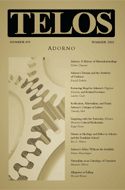There has been an ongoing dispute between defenders of world disclosure (understood here in a loosely Heideggerian sense) and advocates of normative debate. I will take up a recent confrontation between Charles Taylor and Robert Brandom over this question as my point of departure for showing how world disclosure can expand the range of normative argument. I begin by distinguishing pre-reflective disclosure—the already interpreted, structured world in which we find ourselves—from reflective disclosure—the discrete intervention of a particular utterance or text. I discuss Taylor’s notion of social imaginaries as a way of thematizing our pre-reflective background and Talal Asad’s critique of Taylor to show how this background can be one space of argument. I then develop my own understanding of reflective disclosure, of which Taylor gives an inadequate account, developing my argument with help of literature, including a close analysis of Susan Glaspell short story “A Jury of Her Peers.” This story illustrates how world disclosure can make normative arguments without confining itself to Brandom’s or Habermas’s idea of the exchange of reasons.
|
Fabian Freyenhagen’s “Adorno’s Ethics Without the Ineffable” appears in Telos 155 (Summer 2011). Read the full version online at the Telos Online website, or purchase a print copy of the issue in our store. |
||||
|
Telos Press Publishing · PO Box 811 · Candor, NY 13743 · Phone: 212-228-6479 Privacy Policy · Data Protection Copyright © 2024 Telos Press Publishing · All Rights Reserved |
||||
 There is a perennial problem affecting Adorno’s philosophy: his critical theory seems to lack the resources to account for the normative claims it contains. In an influential article, James Gordon Finlayson has analyzed this problem and offered an intriguing solution to it. According to Finlayson, Adorno subscribes to a normative ethics, but this commitment is in tension with his view that we cannot know the good or any positive values (in short, with his negativism). Finlayson argues that by drawing only on resources within Adorno’s philosophy, it is, however, possible to provide access to a kind of good that is suitable as a normative basis for his ethics (namely, the good involved in the experiences of trying to have insights into what is ineffable); and this is the best way to resolve the tension between Adorno’s normative commitment and his negativism. In this essay, I show that this proposal is unsuitable both (1) as a normative basis of Adorno’s ethics and (2) for explaining how it is possible for people to act according to this ethics. I outline an alternative solution that relies only on Adorno’s conception of the bad and defend it against objections.
There is a perennial problem affecting Adorno’s philosophy: his critical theory seems to lack the resources to account for the normative claims it contains. In an influential article, James Gordon Finlayson has analyzed this problem and offered an intriguing solution to it. According to Finlayson, Adorno subscribes to a normative ethics, but this commitment is in tension with his view that we cannot know the good or any positive values (in short, with his negativism). Finlayson argues that by drawing only on resources within Adorno’s philosophy, it is, however, possible to provide access to a kind of good that is suitable as a normative basis for his ethics (namely, the good involved in the experiences of trying to have insights into what is ineffable); and this is the best way to resolve the tension between Adorno’s normative commitment and his negativism. In this essay, I show that this proposal is unsuitable both (1) as a normative basis of Adorno’s ethics and (2) for explaining how it is possible for people to act according to this ethics. I outline an alternative solution that relies only on Adorno’s conception of the bad and defend it against objections. 






